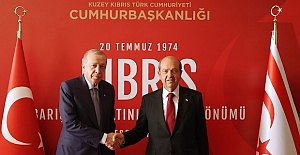Turkey's Alevi community won a victory in Strasbourg on Tuesday, where the European Court of Human Rights (ECHR) supported their claims of religious discrimination in Turkey. The panel of judges found that Alevis "were subjected to a difference in treatment for which there was no objective and reasonable justification."
The ECHR's Grand Chamber ruled by 12 votes to five that Alevis' right to freedom of religion had been violated, while voting 16 to one that the religious group was the subject of discrimination.
"A long overdue verdict. We're very pleased," Melek Yildiz, deputy secretary general for the German Alevi Community (AABF) organization, told DW. "To date, we are still not recognized as a religious minority, which we achieved years ago here in our new home. Turkey could take a leaf out of Germany's book in this regard. We warmly welcome the verdict, and also hope that Turkey really implements changes. This was not the case after past ECHR rulings in our favor."
Secular democracy, but with a single religion
The claimants had demanded that the state support Alevi religious services, for instance recognizing religious leaders as such and recruiting them as civil servants. They also sought official recognition of their places of worship, "cemevis," and state subsidies for the religion. This was rejected in the Turkish courts, which argued that Alevism is a religious movement within Islam rather than a fully-fledged faith.
"The Court held in particular that the authorities' refusal amounted to a lack of recognition of the religious nature of the Alevi faith and its religious practices (cem), depriving the Alevi community's places of worship (cemevis) and its religious leaders (dedes) of legal protection and entailing numerous consequences with regard to the organization, continuation and funding of the community's religious activities," the ECHR said after the ruling.
Turkey's state religious authority, the Diyanet (Directorate for Religious Affairs), helps with various tasks such as building Sunni Muslim mosques.
"Everybody in Turkey pays taxes, but these taxes are only used for a part of the population, for instance building mosques," Yildiz says. "If the cemevi are not recognized as places of worship, then of course that's unjust. So recognizing them is the first step - then the Diyanet could support them as well."
Demir Murat Seyrek, senior policy adviser at the European Foundation for Democracy, says that support for Sunni Islam even goes beyond the Diyanet.
"Their annual budget, for example for 2016, is 2 billion euros ($2.25 billion), but they're only serving the Sunni community in Turkey, no single euro goes to the Alevi community," Seyrek told DW. "On top of that, if you add the entire system - including 600 mid-level schools, university faculties, media, and all the other projects of the Sunni religious community with state support - this would go to 4.5 or 5 billion euros per year."
With up to 15 million Alevis in Turkey, their contribution towards these costs is considerable.
Exhausted avenues in Turkish courts
The claimiants' case dated back to 2005, when they first submitted a petition to then-Prime Minister Erdogan, complaining that Turkey's Religious Affairs Department confined its activities to a single school of Islamic thought while disregarding all others, including Alevism. After several failed appeals, Turkey's top court rejected the complaint in 2010, leaving Izettin Dogan and 202 other Turkish nationals to complain at the European Court of Human Rights instead.
"In the court's view, the Alevi faith had significant characteristics that distinguished it from the understanding of the Muslim religion adopted by the Religious Affairs Department [Diyanet]," the ECHR statement said. "The court, therefore, found that there had been interference with the applicants' right to freedom and religion and that the arguments relied on by the State to justify that interference was neither relevant nor sufficient in a democratic society."
Definitive figures for Alevis in Turkey do not exist, but they are frequently estimated to form between 8 million and 15 million of the country's 77-million population. The community differs from the beliefs of Sunni Islam most prevalent in Turkey, with some saying Alevis are not Muslims at all. They worship on Thursdays rather than Fridays, drink alcohol and question the existence of heaven and hell.
Traditionally, the group tends to vote for left-leaning parties such as the secular Republican People's Party (CHP), the main opposition to President Erdogan's more faith-based, conservative Justice and Development Party (AKP). The leader of the left-leaning CHP, Kemal Kilicdaroglu, is Alevi. In elections last year, the pro-Kurdish HDP also enjoyed broad Alevi support.
The group also bristles as the use of the word "minority" within Turkey, considering itself proud former allies of Mustafa Kemal Atatürk, founder of the modern Turkish state, in his drive to implement a secular society in the war of independence that saw the end of the Ottoman Empire.
Tuesday's verdict also noted "a glaring imbalance" between the Diyanet's attitude to the state-supported Sunni faith and the Alevi community, "as the Alevi community was almost wholly excluded from the public service in question and was covered by the legal regime covering the 'Sufi orders' (tarikat), which were the subject of significant prohibitions."
The court unanimously held that their verdict "constituted in itself sufficient just satisfaction in respect of any non-pecuniary damage sustained by the applicants." The Grand Chamber ruled by 16 to 1 that Turkey should pay 3,000 euros ($3,400) in damages to cover the applicants' costs and expenses.
"It is certainly, I think, an important victory for the Alevi community in Turkey, but on the other hand I think it's just the beginning of the legal struggle," Seyrek said of Tuesday's ruling.
(DW)


 CTCA UK Condemns the Political Forcing Out of Afzal Khan MP for Engaging with Turkish Cypriots
CTCA UK Condemns the Political Forcing Out of Afzal Khan MP for Engaging with Turkish Cypriots Tatar: “Reaction to MP’s TRNC visit is yet another stark example of the Greek Cypriot leadership’s primitive and domineering mentality”
Tatar: “Reaction to MP’s TRNC visit is yet another stark example of the Greek Cypriot leadership’s primitive and domineering mentality” Margaret Greer has been sworn in as the new Mayor of Enfield
Margaret Greer has been sworn in as the new Mayor of Enfield Prime Minister Keir Starmer's 2025 Easter message
Prime Minister Keir Starmer's 2025 Easter message Team Enfield ranks fifteenth the in London Youth Games
Team Enfield ranks fifteenth the in London Youth Games Parking enforcement boosted with more officers on patrol in Enfield
Parking enforcement boosted with more officers on patrol in Enfield Ersin Tatar meets with President Erdoğan
Ersin Tatar meets with President Erdoğan President Ersin Tatar Holds Ministerial-Level Meeting with UK Minister for Europe
President Ersin Tatar Holds Ministerial-Level Meeting with UK Minister for Europe UEFA Europa League and UEFA Conference League draws to be combined into one single show
UEFA Europa League and UEFA Conference League draws to be combined into one single show EuroLeague schedule for 2025-26 season announced
EuroLeague schedule for 2025-26 season announced Zeynep Sonmez becomes first Turkish tennis player to reach third round at Wimbledon
Zeynep Sonmez becomes first Turkish tennis player to reach third round at Wimbledon European champions Arsenal Women will play all of their league matches at the Emirates Stadium
European champions Arsenal Women will play all of their league matches at the Emirates Stadium Enfield Labour welcomes the completion of A10 average speed cameras extension.
Enfield Labour welcomes the completion of A10 average speed cameras extension. TfL opens 2025 grants for community groups to encourage more walking, cycling and active travel in the capital
TfL opens 2025 grants for community groups to encourage more walking, cycling and active travel in the capital Fethiye Launches International Digital Tourism Campaign with UK-Based Publisher
Fethiye Launches International Digital Tourism Campaign with UK-Based Publisher Highlights from the 3rd Trans-Caspian Connectivity Conference in London
Highlights from the 3rd Trans-Caspian Connectivity Conference in London














